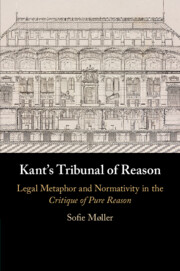Book contents
- Kant’s Tribunal of Reason
- Kant’s Tribunal of Reason
- Copyright page
- Dedication
- Contents
- Acknowledgements
- Abbreviations
- Introduction
- Chapter 1 The Critique of Pure Reason as the Establishment of Reason’s Lawful Condition
- Chapter 2 The Normativity of Law
- Chapter 3 The Transcendental Deduction of the Categories and the Tradition of Legal Deductions
- Chapter 4 The Question of Fact and the Question of Law in Judicial Imputation and in the Transcendental Deduction of the Categories
- Chapter 5 The Tribunal of Reason
- Chapter 6 Moral Conscience as the Practical Inner Tribunal
- Chapter 7 Distinguishing between Rightful Claims and Groundless Pretensions
- Chapter 8 Epistemic Authority as both Individual and Collectively Shared
- Chapter 9 Systematicity and Philosophy as the Legislation of Reason
- Conclusion
- Bibliography
- Index
Chapter 4 - The Question of Fact and the Question of Law in Judicial Imputation and in the Transcendental Deduction of the Categories
Published online by Cambridge University Press: 24 February 2020
- Kant’s Tribunal of Reason
- Kant’s Tribunal of Reason
- Copyright page
- Dedication
- Contents
- Acknowledgements
- Abbreviations
- Introduction
- Chapter 1 The Critique of Pure Reason as the Establishment of Reason’s Lawful Condition
- Chapter 2 The Normativity of Law
- Chapter 3 The Transcendental Deduction of the Categories and the Tradition of Legal Deductions
- Chapter 4 The Question of Fact and the Question of Law in Judicial Imputation and in the Transcendental Deduction of the Categories
- Chapter 5 The Tribunal of Reason
- Chapter 6 Moral Conscience as the Practical Inner Tribunal
- Chapter 7 Distinguishing between Rightful Claims and Groundless Pretensions
- Chapter 8 Epistemic Authority as both Individual and Collectively Shared
- Chapter 9 Systematicity and Philosophy as the Legislation of Reason
- Conclusion
- Bibliography
- Index
Summary
This chapter presents a novel interpretation of the transcendental deduction which uses judicial imputation as a guide for understanding the structure and aim of the argument. Møller argues that the metaphysical deduction should not be read as the answer to the question quid facti, which should instead be found within the transcendental deduction. The parallel with judicial imputation shows that the transcendental deduction is a proof of an authorisation to judge. Judicial imputation presupposes that the judge has both the authority to subsume the case under the law and to apply the effects of the law to the case. This leads to a two-step interpretation of the B edition of the transcendental deduction, which focuses on appearances necessarily falling under the categories and the authorisation of the understanding to apply the categories to appearances.
Keywords
- Type
- Chapter
- Information
- Kant's Tribunal of ReasonLegal Metaphor and Normativity in the <I>Critique of Pure Reason</I>, pp. 65 - 80Publisher: Cambridge University PressPrint publication year: 2020

